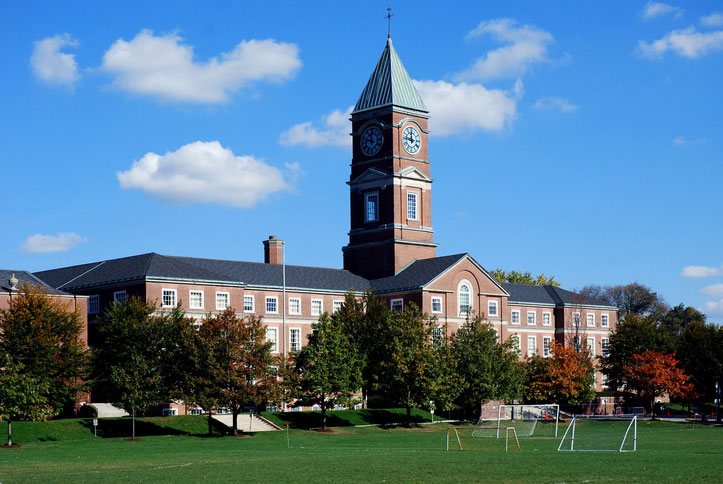Charter Schools vs. Private Schools: What’s the Difference, and Why Does it Matter?
By Brian Miller, Secondary Principal
 Teachers want to be great at what they do. They want to make connections with their kiddos, improve the lives and minds of those they teach, and leave work each day knowing they made a difference, that they’re time and efforts mattered.
Teachers want to be great at what they do. They want to make connections with their kiddos, improve the lives and minds of those they teach, and leave work each day knowing they made a difference, that they’re time and efforts mattered.
For many soon-to-be teachers and even many seasoned teachers, the type of school they choose to work at can make all the difference. Like a tree being freshly planted in the spring, if the soil and surrounding conditions aren’t appropriate for the tree, it will never grow and flourish as it was intended to. No matter how much love and care are provided.
As a young educator looking to enter the teaching profession, it is imperative that you understand the different types of schools available, be it public vs charter or charter vs private, understanding the unique nuances is critical to understanding which environment is best suited to you. Will a private school support you where you need them most? Maybe. Will a charter school allow your skills and talents to flourish? Possibly. It all depends on you, what you need, and where you want to go. As a professional, and as an individual.
Below is a breakdown of charter and private schools. Where they differ, where they overlap, and where they are simply one and the same.
Charter School vs Private School: A Simple Comparison
Is a charter school a private school? No. A charter school is different than a private school:
- Charter schools are public schools that are independent from their local school districts. They are tuition free and publicly funded yet independently run.
- Private schools, on the other hand, are private organizations run by private individuals. They do not receive public funding, depending solely on student tuition and private donors.
 These differences, although seemingly small, greatly impact the schools. From budget decisions, curriculum and discipline procedures, to the diversity of the student body, the difference between a charter and a public school is the difference between an apple and a pineapple. Both are fruits that are healthy for you and great for kids. But they taste radically different. Their texture is different, their roots and trees are different, and the climate from which they grow is different. One is not better than another, they are just different. And to the extent to which you enjoy them depends upon your taste.
These differences, although seemingly small, greatly impact the schools. From budget decisions, curriculum and discipline procedures, to the diversity of the student body, the difference between a charter and a public school is the difference between an apple and a pineapple. Both are fruits that are healthy for you and great for kids. But they taste radically different. Their texture is different, their roots and trees are different, and the climate from which they grow is different. One is not better than another, they are just different. And to the extent to which you enjoy them depends upon your taste.
The difference between a charter and private school is no different. It simply comes down to taste; to one’s unique preference.
Charter vs Private Schools – Differences in Funding
Without governmental oversight, private and charter schools advertise themselves as having the freedom to make decisions, independently and autonomously. And although there is some truth to this, it is also somewhat misleading because anytime money is exchanged between two parties, expectations are sure to follow.
Charter schools, although independently run, are still required to meet the standards outlined in their charter if they hope to receive their state funding. From a regulatory perspective, they have more freedoms than a public school, but less than a private.
Private schools receive zero state or federal funding, leaving them completely independent from the government. They do, however, rely completely on student tuition and private donations, leading private schools to view parents sort of as clients and investors. Instead of government regulations, private schools must cater to the goals and considerations of parents, lest they lose their funding.
Charter vs Private Schools – Differences in Pay
While being privately funded and free from the expectations of the federal or state government, that freedom can come at the cost to teacher pay.
On average, charter school teachers earn roughly $40,000 per year, with private school teachers earning slightly less, at $37,000 per year, depending on location.
According to the U. S. Bureau of Labor Statistics, the average public-school teacher salary is $50,000, and goes higher from there. In addition, there are some private schools that pay their teachers hourly, rather than on salary, without yearly raises.
Charter vs Private Schools – Differences in Teacher Autonomy
 Teachers in private and charter schools generally have more freedoms in their teaching styles and curriculum than their public-school counterparts, but not entirely. As mentioned previously, whoever pays the bills that turns on the power has a say in what happens inside the building. Generally speaking, parents who sign their children up for charter or public schools tend to do so because they are in favor of the teaching and curriculum offered, and are therefore supportive of the teachers and direction of the school. But not always.
Teachers in private and charter schools generally have more freedoms in their teaching styles and curriculum than their public-school counterparts, but not entirely. As mentioned previously, whoever pays the bills that turns on the power has a say in what happens inside the building. Generally speaking, parents who sign their children up for charter or public schools tend to do so because they are in favor of the teaching and curriculum offered, and are therefore supportive of the teachers and direction of the school. But not always.
When it comes to teacher autonomy, the difference between charter schools and private schools is that students of private schools are paying customers, leading to greater expectations of behavior and academic achievement. This expectation can have a variety of consequences. One, parents who are paying for their child’s education generally have higher standards for their child, lead to better behaved students who are more engaged in the work, allowing teachers more opportunities to engage in more rigorous and experimental teaching practices. The other potential consequence, however, is that because parents are paying for their child’s education, they assume they have easier access to the school’s leadership team and therefore more say on the direction of instruction and content on the school.
Generally speaking, however, teachers in private schools have more freedoms than charter school teachers who in turn have more freedoms than a public-school teacher.
Charter vs Private Schools – Differences in Responsibilities and Contracts
Unlike public schools, neither charter nor private schools require teacher certification. Charter schools, however, depending on the state, may have stricter requirements and expect you to be certified. To teach in a private school, there is no requirements – from the government anyway – for teacher certification.
However, for both schools, being a certified teacher is always a benefit as it not only shows that you are highly qualified for the position, it makes you a better teacher. Being a better teacher allows you to enjoy your job more, as you feel confident and more successful. It also allows you better opportunities to connect with and impact your students. Being a certified teacher can also increase your pay, but not always.
Typically, neither private nor charter schools have teacher unions. This matters because, without representation, teachers can lose their leverage against their employer when it comes to pay, hours worked, and expected duties. It is not uncommon for teachers in private and charter schools to incur extra roles and responsibilities without additional pay.
As a teacher, you are provided basic constitutional rights (such as the CIVIL RIGHTS Act of 1964 which prohibits racial, sexual, and religious discrimination). Working at a private school, however, removes some guaranteed constitutional protections such as teacher tenure, freedom of expression, and the procedure of due process.
Because charter schools receive federal funding and adhere to various federal guidelines, teachers are often more protected than those in private schools but still less than those in public schools.
Charter vs Private Schools – Differences in the Student Body and How Students are Served
Difference Between Charter School and Private School Diversity
Both charter and public schools advertise themselves as schools that provide smaller class sizes, which is a benefit to both the student and the teacher as small class sizes provides for more diverse teaching and assessment strategies as well as greater student engagement. But there is one difference between charter and private school that directly impacts the student population, and that is government funding. Because private schools receive zero federal funding they are not subject to any federal regulations of discrimination.
Charter schools cannot legally discriminate against students, based on their race, gender, or financial status. Private schools can – and do. It is not uncommon for private schools to deny access to students who do not fit their ideologies, religious beliefs, or sexual preference (as in, all-boys or all-girls schools). This practice greatly reduces the diversity teachers will find in their classroom and even faculty.
The Difference Between Charter School and Private School Sometimes Comes Down to a Student vs Customer Relationship
As mentioned earlier, students in a private school are paying full-tuition rather than being federally funded like a charter school. This difference has immediate impact on a teacher as it immediately shifts their perspective of the young adults sitting in their classroom.
In a public or charter school, young adults are students who are there to learn what the federal or local government requires. In a private school, however, those young adults are no longer students, they are customers (or more accurately, the children of the customers) who have paid for a product, and if they are not satisfied with their product, they can – and will – pull their support. This can create a difficult environment for teachers and school leaders within a private school as they can suddenly find themselves performing a balancing act of academic integrity and satisfying a well-paying customer. Especially when it comes to grades.
Customers who spend a great deal of money want a return for their investment. When a student struggle academically, the responsibility can often be placed on teacher rather than the student, creating a potentially unequal balance of responsibility and work.
Difference Between Charter School and Private School When it Comes to Achievement
All schools, whether public, private, or charter are assessed by the public based upon student achievement. And the most universal assessment of student achievement are standardized test scores (SAT, for example). Studies continually show that students who attend private schools generally score slightly higher than their charter counterparts.
There are several factors that may influence this data, including teacher autonomy and smaller class sizes, but the other piece to consider is that private schools can select their student body. Because they are private, they can choose the best and brightest students, place them in a small classroom environment, provide quality instruction, and trust that they will receive added support (via private tutors). They can also provide scholarships to students who cannot afford their tuition but can help bolster their academic prowess. Thus skewing the data slightly in their favor.
Yet, the question always remains. Do private schools perform better than charter schools? The answer is yes. But only because they benefit from extra funding and a more selective enrollment process. Both provide a quality education and support teacher autonomy. Private schools just have more control over who attends their schools and who doesn’t.<
What are the Pros and Cons of a Charter School?
 In all fairness, there are none. Or, there are many. It all depends on what you’re looking for. If you want the qualities of a charter school imprinted upon your child, then the pros are many. If you don’t appreciate or support the unique dynamics and perspectives of a charter school, then the cons are equally many. It all depends on what you want, what fits you, and then choosing one over the other. Both have their strengths and their weakness. Both of them also love their students and work hard to support them and prepare them for their unknown future. It just depends on which one you think fits you best.
In all fairness, there are none. Or, there are many. It all depends on what you’re looking for. If you want the qualities of a charter school imprinted upon your child, then the pros are many. If you don’t appreciate or support the unique dynamics and perspectives of a charter school, then the cons are equally many. It all depends on what you want, what fits you, and then choosing one over the other. Both have their strengths and their weakness. Both of them also love their students and work hard to support them and prepare them for their unknown future. It just depends on which one you think fits you best.
Private and charter schools may be cut from a similar cloth, but the product with which they create can be radically different at times. Knowing what you need as a person and as a professional is crucial in determining which school is best. Understanding e difference between the schools, their history and expectations, can help determine which one can best fit your needs and support you in your profession. That fit, although seemingly insignificant, can have a significant impact on your future, both professionally and personally. It can also have an impact on how well you connect with your students, how you teach and inspire them, and how you help guide them into their unknown future.
For more comparisons, check out Charter vs Public Schools: Your Complete Guide to Understanding the Differences and Similarities.
